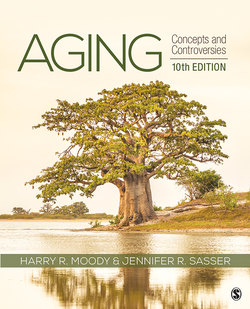Читать книгу Aging - Harry R. Moody - Страница 59
На сайте Литреса книга снята с продажи.
Focus on Practice
ОглавлениеReminiscence and Life Review
As people grow older, it is not unusual for them to reminisce about the “good old days.” Feelings of both nostalgia and regret are commonly part of this attitude toward the past. A stereotypical response to reminiscence is to assume that older people are interested only in the past or, still worse, to see those who dwell on past memories as showing signs of escapism or even mental impairment. But late-life reminiscence may be a normal form of life review, which Robert Butler (1963) defined as a natural, even universal process stimulated by awareness of approaching death. He also wrote:
The life review is characterized by a progressive return to consciousness of past experience, in particular the resurgence of unresolved conflicts which can now be surveyed and integrated…. If unresolved conflicts and fears are successfully reintegrated they can give new significance and meaning to an individual’s life. (Butler, 1974, p. 534)
Butler’s view is similar to that of Erik Erikson, who sees the psychological task of late life as achieving ego integrity, a reintegration of all aspects of the individual’s life. Both Erikson and Butler based their psychological theories on the importance of finding meaning in the last stage of life. But do the facts support their theories? Just how important is reminiscence in old age?
Some studies have shown that older adults actually do not spend much more time daydreaming about the past than do people of other ages (Gambria, 1977), so it may be a mistake to see life review as a universal process. However, regardless of frequency, reminiscence may have adaptive value; that is, it may promote better mental health in old age. One early study of reminiscence found that people who spend time thinking about the past are less likely to suffer depression (McMahon & Rhudick, 1967). Some psychologists who have studied life review feel it may be a psychological defense mechanism that helps some people adjust to memories of an unhappy past. In that sense, reminiscence could be described as an adaptive feature of old age (Coleman, 1974), which is something to be encouraged (Brennan & Steinberg, 1983–1984).
Reminiscence and life review appear to help some older people bolster their self-image. By recalling the past, older adults can improve self-esteem and establish solidarity with others of their own generation. We might interpret older people’s interaction with the young as a way to help them maximize perceived power or status, just as the exchange theory of aging predicts. When activity is the preferred style, older people are likely to downplay reminiscence in favor of talking about present or future events. But when disengagement is the preferred style, older people may emphasize past accomplishments.
Some gerontologists recommend that reminiscence and life review can have great value for older people who can no longer remain active (Haight & Haight, 2007). For that reason, reminiscence groups have been encouraged as a form of therapy among some nursing home residents and senior center participants. Guided autobiography is a method used as a basis for education in the later years (Birren & Cochran, 2001). Spiritual autobiography groups have played a similar role in religious congregations.
All these methods can be useful for practitioners who work with older people, but techniques to encourage reminiscence as a form of practice must not divert us from a basic question: Is reminiscence or life review the best way of achieving a sense of meaning in old age? The response to that question cannot be purely scientific, but depends on basic values and philosophy of life. For example, if we follow philosopher Simone de Beauvoir’s view, then activity and future orientation are the best approaches to finding meaning in old age. She would therefore discourage people from spending time reminiscing about the past, unless past memories can somehow contribute to improving the world. Psychologist Carl Jung, in contrast, would see great value in inwardness or interiority in old age. The purpose or meaning of old age, in his view, is not necessarily to be active, but to know ourselves better and to accept ourselves as individuals (Sawin, Corbett, & Carbine, 2014). If life review can promote that goal, then Jung would encourage it, and Florida Scott-Maxwell, for example, follows along the lines suggested by Jung.
Do the reminiscence and life review by older people have meaning for people of other ages? Clearly, there is something special about old age precisely because it is the final stage of life. The last stage includes an awareness of finitude and a shortened time perspective (Kastenbaum, 1983). Furthermore, as the pace of social change increases, older people can no longer take for granted that their values will be shared by other cohorts; the 1960s and World War II generations may be quite different, not only from one another but from Generation X, born during the baby bust after the mid-1960s. The old may be perceived by others or perceive themselves as belonging to “the past,” regardless of their own subjective time orientation. Young people may assume that reminiscence is something appropriate only for the old.
In fact, the process of life review or autobiographical consciousness is not limited to old age, but occurs at transitions across the adult life course—for instance, in self-assessment after a job loss or another major life change. The life course perspective helps us appreciate links between subjective and objective time orientations and to see life review in broader terms. The search for meaning in life occurs not only at the end of life, but every time human beings become aware of their limited time on earth. It is perhaps for that reason that in the Bible the Psalms include a prayer for God to help us all “number our days” and thus cherish each passing moment, whatever our age may be.
